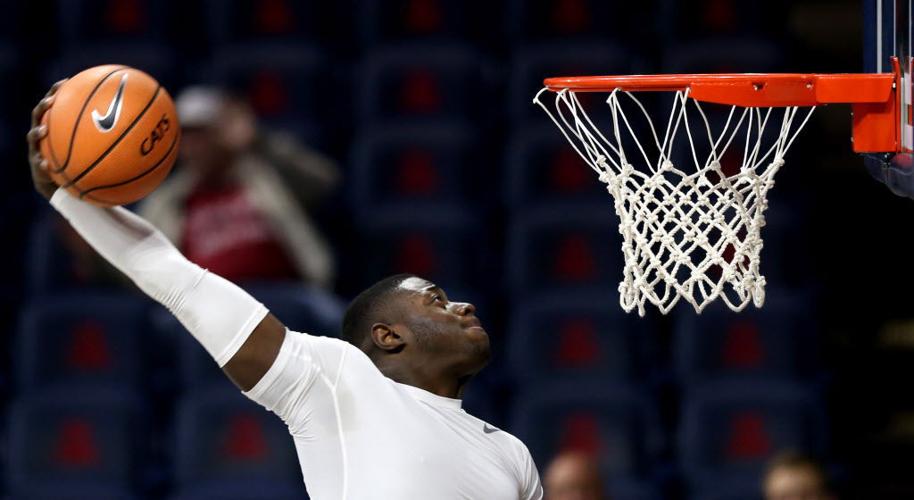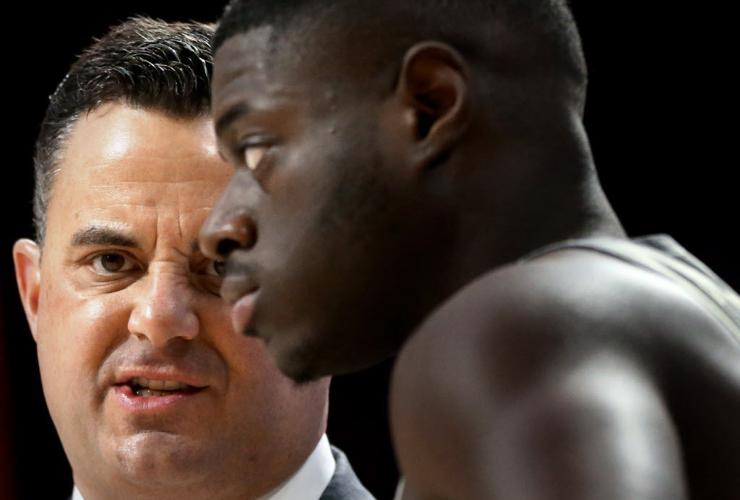On any given night, the Arizona Wildcats can pretty much count on a dominating performance from Deandre Ayton, and, increasingly so, some all-conference-level play from Dusan Ristic around the basket.
Then there’s Allonzo Trier’s ever-efficient scoring and penchant for getting to the free-throw line, and Parker Jackson-Cartwright’s usually consistent playmaking.
That leaves Rawle Alkins, his jump shot, and his foot.
While neither he nor UA coach Sean Miller will call Alkins an X-factor, the truth is this:
Of the Wildcats’ six losses this season, Alkins didn’t play in three of them and in the others, he shot 29.4 percent overall and 20 percent from 3-point territory.
Of the Wildcats’ 11 wins that Alkins has played in, he’s shooting 50 percent overall and 45.4 percent from deep.
Last week provided typical examples on both ends.
On Thursday, Alkins was 2 of 9 from the field, made only 1 of 5 3-pointers … and the UA lost 82-74 to UCLA. On Saturday, Alkins was 7 of 12 from the field, hit 4 of 7 3-pointers … and the UA beat USC 81-67.
Because of that, UA coach Sean Miller was asked after the USC game if the Wildcats will go as far as Alkins takes them. Miller immediately responded with a different answer.
“This team goes as Deandre goes,” Miller said. “His defense sets the tone for a lot. You have to realize he’s 7 foot and 260 pounds.”
Alkins also said he didn’t really buy into the X-factor notion, noting that when he was 2 of 11 in Washington on Feb. 4, the Huskies won only because of a buzzer-beating 3 from Dominic Green, who scooped up a loose ball Ayton had batted near him via a blocked shot.
It’s also true, of course, that two of the Wildcats’ losses in the Bahamas without Alkins were decided within two possessions and another, at Colorado, was an 80-77 decision.
“Obviously, I would always want to play (well) every game but on nights I’m not shooting well, like the Washington game, we still had an opportunity to win,” Alkins said. “Green just hit a crazy shot. It was a tough shot. There’s nothing we can do about that.
“I wouldn’t say that as far as I go the team goes, because it’s a team game, and everyone’s gonna have their night and everyone going to have better nights than others.”
Whatever the case, there’s also the matter of intangibles that Alkins brings when he’s on. Ristic spoke to that after the USC game.
“Many times this year Rawle brings us some kind of toughness,” Ristic said then. “When he plays well, it affects everybody on the court and everybody plays with a chip on their shoulder with extra energy, and tonight was an example of that.”
There’s evidence that the Wildcats suffer a bit when they don’t have that infusion, too.
Alkins missed the first nine games of the season with a broken right foot — including the UA’s disastrous appearance in the Battle 4 Atlantis — and after he returned to play in the next nine, he sat out at Cal on Jan. 17 when soreness crept back in.
The Wildcats didn’t miss him that night, but when he sat out home games with Colorado and Utah the following week, Arizona led the Buffaloes by just a point with seven minutes to go and then beat the Utes by only a point.
But, because Miller and the UA’s medical team wanted to make sure Alkins didn’t suffer long-term issues (which could also affect his draft stock), the Wildcats have tried to bring him along slowly and be extra cautious with any hint of soreness. That’s why Alkins didn’t play in the three January games, and why Miller said after that Alkins would take a day of rest here and there even while he is playing in games.
That didn’t work, Alkins said. After sitting out practice on Feb. 2, a day after he played well at Washington State, Alkins returned for practice on Feb. 3 and then played at UW on Feb. 4, when he struggled.
Alkins also struggled last Thursday against UCLA after taking it easy early in the week.
“I think that’s why I had the little rust, because I would practice one day and then be off the next day and then just play in the game,” Alkins said. “So I told them about that. We had that talk. I think we’re gonna go back to the original plan and I think I should be like everyone else on the team, until I feel any soreness on my foot.
“I love the University of Arizona being so cautious with my injury, and their focus on me long term — not just me for the season — and I appreciate them for that. But at the end of the day I want to be just like everyone else, too.”
Alkins said the foot has never been connected to his shooting, even as some shooters crave the same feeling when they are spotting up for shots, and says he can even now “probably jump a little higher.”
So, while speaking with characteristic smile and laughter during an appearance at the UA’s weekly news conference Monday, Alkins basically gave this message: Don’t worry about him.
“I think people are thinking ‘His leg, his foot is not feeling good because he missed a shot,’” Alkins said. “That’s not the case. I jump off that leg 100 percent like I did before the injury. So everything is great. I just had a bad two weeks.
“It’s like the world is over when you have a couple of bad games. But I’m happy to bounce back from that game and I think the best is yet to come.”





